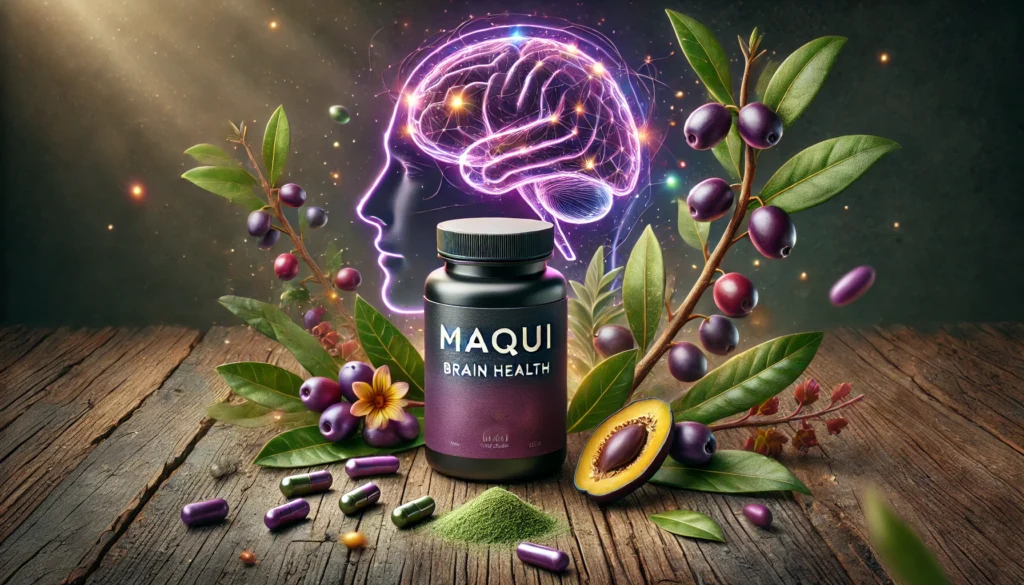Maqui (Aristotelia chilensis) is a deep-purple berry native to the Patagonian region of Chile and Argentina, revered for its rich antioxidant content and potential health benefits. Traditionally used by the Mapuche people, the berry has gained recognition in the modern wellness community for its potential benefits as a nootropic—substances that may improve cognitive function. This article explores the scientific foundation of maqui’s nootropic potential, covering its origin, chemical composition, physiological effects, recommended dosages, side effects, drug interactions, and considerations for safe supplementation.
You May Also Like:
Maqui: Potential Nootropic Benefits, Dosage, Side Effects, Interactions, and Other Important Information About This Supplement is an original (NootropicsPlanet) article.
Sources of Maqui
Maqui grows naturally in the fertile and temperate regions of southern Chile and Argentina. The berry itself has become a sought-after supplement, usually found in the form of powders, capsules, or concentrated extracts. Here are some primary sources of maqui:
- Wild Maqui Berries: Fresh or dried berries are a potent source of nutrients and antioxidants, although they are challenging to find outside of the native regions.
- Powdered Supplements: Maqui berry powder, which retains the antioxidants of the fresh berry, is commonly used in smoothies and drinks for a concentrated dose.
- Capsules and Extracts: For those seeking convenience, maqui is available as standardized extracts, often labeled by their content of anthocyanins or delphinidins—its primary active compounds.

Chemistry of Maqui
The bioactivity of maqui berries stems from their high concentration of polyphenols, particularly anthocyanins and delphinidins. These compounds are known for their antioxidant properties, which neutralize reactive oxygen species (ROS) and reduce oxidative stress.
- Anthocyanins: These pigments provide the berry’s deep purple hue and are effective antioxidants. Anthocyanins have demonstrated neuroprotective and anti-inflammatory effects, as they scavenge free radicals and protect brain cells from oxidative damage, a key contributor to neurodegenerative diseases.
- Delphinidins: Unique to maqui, delphinidins are a subgroup of anthocyanins that contribute to its potent antioxidant profile. These compounds are highly bioavailable, meaning they are quickly absorbed and utilized by the body. Research suggests that delphinidins may modulate cellular signaling pathways related to inflammation and oxidative stress, offering protection against neuron damage and cognitive decline.
Together, these compounds make maqui one of the most potent natural sources of antioxidants, supporting cognitive health by promoting cellular resilience against oxidative damage.
Physiological Mechanisms of Maqui in the Body and Brain
Maqui’s primary physiological effect centers on its antioxidant and anti-inflammatory properties, which may be beneficial for brain health. By reducing oxidative stress and inflammation, maqui can mitigate some of the key factors associated with cognitive decline, supporting mental clarity, focus, and overall cognitive performance.
- Antioxidant Defense and Neuroprotection: The high antioxidant content in maqui, particularly from anthocyanins and delphinidins, plays a significant role in brain health. These antioxidants can cross the blood-brain barrier, protecting brain cells from oxidative damage—a contributor to aging and cognitive impairment. By reducing oxidative stress, maqui may help prevent age-related neurodegenerative diseases like Alzheimer’s and Parkinson’s.
- Anti-inflammatory Effects: Chronic inflammation is another major factor in cognitive decline. Studies indicate that maqui’s compounds, especially delphinidins, inhibit key inflammatory markers. This effect may reduce inflammation in brain tissues, supporting cognitive longevity and potentially improving mood regulation by promoting healthy neuronal communication.
- Blood Sugar Regulation: Emerging evidence suggests that maqui may help regulate blood sugar levels. By improving insulin sensitivity, maqui could indirectly benefit brain health, as stable blood sugar levels are associated with better cognitive performance and mood stability.
- Mitochondrial Support: Mitochondria are responsible for energy production in cells, including neurons. Maqui’s antioxidant properties support mitochondrial function, ensuring a steady supply of energy to the brain. This support may enhance focus, memory, and learning by sustaining cellular energy levels, even during periods of mental exertion or stress.

Nootropic Benefits of Maqui
Although research on maqui as a nootropic is still developing, existing studies suggest several promising cognitive benefits associated with its unique bioactive compounds:
- Enhanced Cognitive Function: By reducing oxidative damage and inflammation in the brain, maqui supports overall cognitive health. This effect may translate into improved focus, memory, and processing speed, particularly in aging adults or individuals under chronic stress. The antioxidants in maqui help protect brain cells from environmental toxins and lifestyle-related oxidative stress, further promoting mental sharpness. Additionally, maqui’s anti-inflammatory properties may enhance neural communication, potentially increasing processing speed and accuracy during mentally demanding tasks.
- Mood Regulation: Preliminary research suggests that anthocyanins may positively affect neurotransmitter levels, such as dopamine and serotonin, which play roles in mood and mental clarity. While not a direct treatment for mood disorders, maqui’s antioxidant and anti-inflammatory effects may improve mental resilience and well-being. Maqui may also help stabilize stress hormone levels, which can improve responses to daily stressors and reduce irritability. By fostering a balanced emotional state, maqui may contribute to a sustained sense of well-being and mental stability over time.
- Mental Clarity and Alertness: Through its effects on blood sugar stability and mitochondrial support, maqui may reduce mental fatigue and sustain energy levels, promoting mental clarity and alertness. These properties make it potentially useful for individuals seeking a natural cognitive boost without the stimulant effects of caffeine. The stable blood sugar levels facilitated by maqui may also improve reaction times and concentration during extended periods of mental activity. Furthermore, maqui’s impact on cellular energy production may help reduce brain fog and enhance decision-making skills.
- Protection Against Age-related Cognitive Decline: The neuroprotective qualities of maqui, particularly its impact on oxidative stress, may slow the progression of cognitive decline associated with aging. Although more research is needed, maqui holds potential as a preventative nootropic supplement for individuals looking to maintain cognitive function over time. By supporting neuron integrity and limiting age-related oxidative damage, maqui could help preserve memory and learning abilities in older adults. The berry’s bioactive compounds may also protect against mild cognitive impairment, a condition often seen in early stages of dementia, making it valuable for long-term brain health.

Dosage and Supplementation Guidelines
For general health and cognitive support, there is currently no established Recommended Daily Allowance (RDA) for maqui, as it is not an essential nutrient. However, guidelines based on available research suggest:
- General Dosage for Antioxidant Support: Studies on maqui’s antioxidant benefits often use doses ranging from 500 mg to 2,000 mg of maqui berry extract per day. This amount is typically enough to support general health and provide nootropic benefits related to oxidative stress and inflammation reduction.
- High-concentration Dosage for Cognitive Benefits: For those specifically seeking cognitive support, a dosage of around 1,000 mg per day is generally effective without posing a risk of side effects. However, individual responses may vary, and consulting a healthcare provider before initiating higher doses is advisable.
- Supplement Forms: Maqui supplements are available in various forms, including powder, capsules, and liquid extracts. Standardized extracts with a specified concentration of delphinidins are recommended to ensure consistent potency.
Side Effects and Safety
Maqui is generally well-tolerated, with few reported side effects when taken at recommended doses. However, individuals taking large doses may experience some mild adverse effects:
- Digestive Distress: Large doses of maqui may cause mild gastrointestinal symptoms, such as bloating, diarrhea, or stomach discomfort, especially when first introduced to the body.
- Low Blood Pressure: Since maqui has mild blood sugar-lowering properties, those with low blood pressure or those taking antihypertensive medications should exercise caution.
- Allergic Reactions: Although rare, some individuals may experience allergic reactions to maqui. Symptoms can include itching, swelling, or skin rash.

Interactions with Other Supplements and Medications
Maqui may interact with certain medications and supplements, necessitating caution and awareness:
- Antidiabetic Medications: Given maqui’s potential to lower blood sugar, individuals taking insulin or other antidiabetic drugs should consult a healthcare provider to avoid hypoglycemia (low blood sugar levels).
- Antihypertensive Drugs: Maqui may enhance the effects of blood pressure-lowering medications. Those on antihypertensive treatment should monitor their blood pressure closely when starting maqui to avoid hypotension.
- Antioxidant Supplements: Combining maqui with other high-potency antioxidants (such as vitamin C, vitamin E, or glutathione) may potentiate antioxidant effects. While beneficial for some, excessive antioxidant intake can interfere with certain cellular processes and may not be suitable for everyone.
- Nootropic Combinations: Maqui may be combined with other nootropics like L-theanine or bacopa for enhanced cognitive support. However, individuals should monitor for any side effects, as the combined effect on mood and alertness may be too stimulating for some users.
Risks for Individuals with Certain Health Conditions
While maqui is safe for most individuals, certain populations should approach supplementation with caution:
- Diabetes or Hypoglycemia: Maqui’s ability to lower blood sugar could pose risks for those with diabetes or hypoglycemia. Close monitoring of blood glucose levels is recommended, particularly if the individual is taking medications that lower blood sugar.
- Autoimmune Disorders: Due to its immune-modulating effects, individuals with autoimmune conditions should consult a healthcare provider before taking maqui, as it may either exacerbate or mitigate autoimmune activity.
- Pregnancy and Breastfeeding: Although maqui has no known toxicity in pregnancy, the absence of specific safety data suggests caution. Pregnant and breastfeeding individuals should consult their healthcare provider before using maqui.
Conclusion: Should You Consider Maqui as a Nootropic?
Maqui’s high concentration of antioxidants, particularly delphinidins and anthocyanins, offers a compelling case for its use as a natural nootropic supplement. Its ability to support brain health through antioxidant defense, anti-inflammatory effects, and blood sugar regulation suggests several pathways through which it may benefit cognitive function, mental clarity, and mood regulation. However, more research is needed to fully substantiate its role as a nootropic, especially concerning optimal dosing and long-term safety.
For those interested in exploring natural supplements for cognitive enhancement, maqui represents a promising option, particularly for individuals concerned with oxidative stress and neuroprotection. As with any supplement, it is important to seek guidance from a healthcare professional, particularly if there are existing health conditions or other medications involved. While research continues to develop, maqui’s potential as a nootropic is promising, offering a natural and well-tolerated option for supporting cognitive health and resilience.

References:
- 10 Benefits and Uses of Maqui Berry. Retrieved from: https://www.healthline.com/nutrition/maqui-berry-benefits
- Maqui – Uses, Side Effects, and More. Retrieved from: https://www.webmd.com/vitamins/ai/ingredientmono-1257/maqui
- Health Benefits of Maqui Berry. Retrieved from: https://www.simplysupplements.co.uk/healthylife/supplements/maqui-berry-benefits
- How Maqui Berry Benefits the Gut, Heart, Skin & Eyes. Retrieved from: https://draxe.com/nutrition/maqui-berry-benefits/
- The Anti-Neuroinflammatory Role of Anthocyanins and Their Metabolites for the Prevention and Treatment of Brain Disorders. Retrieved from: https://pmc.ncbi.nlm.nih.gov/articles/PMC7696928/
Important Note: The information contained in this article is for general informational purposes only, and should not be construed as health or medical advice, nor is it intended to diagnose, prevent, treat, or cure any disease or health condition. Before embarking on any diet, fitness regimen, or program of nutritional supplementation, it is advisable to consult your healthcare professional in order to determine its safety and probable efficacy in terms of your individual state of health.
Regarding Nutritional Supplements Or Other Non-Prescription Health Products: If any nutritional supplements or other non-prescription health products are mentioned in the foregoing article, any claims or statements made about them have not been evaluated by the U.S. Food and Drug Administration, and such nutritional supplements or other health products are not intended to diagnose, treat, cure, or prevent any disease.


